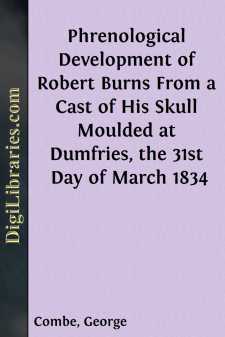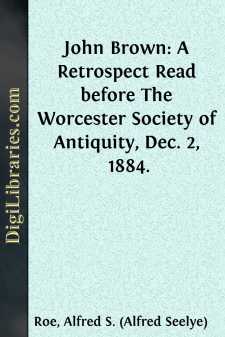Non-Classifiable
- Non-Classifiable 1768
Non-Classifiable Books
Sort by:
INTRODUCTION This discussion of the characters of Pinus is an attempt to determine their taxonomic significance and their utility for determining the limits of the species. A systematic arrangement follows, based on the evolution of the cone and seed from the comparatively primitive conditions that appear in Pinus cembra to the specialized cone and peculiar dissemination of Pinus radiata and its...
more...
by:
Charles Darwin
Enamel and Dentine.—As the secretion decalcified ordinary bone, I determined to try whether it would act on enamel and dentine, but did not expect that it would succeed with so hard a substance as enamel. Dr. Klein gave me some thin transverse slices of the canine tooth of a dog; small angular fragments of which were placed on four leaves; and these were examined each succeeding day at the same hour....
more...
by:
John Morley
CHAPTER I.OTHER DIALOGUES. We may now pass to performances that are nearer to the accepted surface of things. A short but charming example of Diderot’s taste for putting questions of morals in an interesting way, is found in the Conversation of a Father with his Children (published in 1773). This little dialogue is perfect in the simple realism of its form. Its subject is the peril of setting one’s...
more...
by:
Joseph Fisher
I do not propose to enter upon the system of landholding in Scotland or Ireland, which appears to me to bear the stamp of the Celtic origin of the people, and which was preserved in Ireland long after it had disappeared in other European countries formerly inhabited by the Celts. That ancient race may be regarded as the original settlers of a large portion of the European continent, and its land system...
more...
by:
Margaret Fuller
CHAPTER I.Niagara, June 10, 1843.Since you are to share with me such foot-notes as may be made on the pages of my life during this summer's wanderings, I should not be quite silent as to this magnificent prologue to the, as yet, unknown drama. Yet I, like others, have little to say where the spectacle is, for once, great enough to fill the whole life, and supersede thought, giving us only its own...
more...
by:
Daniel Defoe
FROM LONDON TO LAND’S END Sir, I find so much left to speak of, and so many things to say in every part of England, that my journey cannot be barren of intelligence which way soever I turn; no, though I were to oblige myself to say nothing of anything that had been spoken of before. I intended once to have gone due west this journey; but then I should have been obliged to crowd my observations so...
more...
by:
George Combe
The cast of a Skull does not show the temperament of the individual, but the portraits of Burns indicate the bilious and nervous temperaments—the sources of strength, activity, and susceptibility; and the descriptions given by his contemporaries of his beaming and energetic eye, and the rapidity and impetuosity of his manifestations, establish the inference that his brain was active and susceptible....
more...
by:
Joseph Bedier
THE CHILDHOOD OF TRISTAN My lords, if you would hear a high tale of love and of death, here is that of Tristan and Queen Iseult; how to their full joy, but to their sorrow also, they loved each other, and how at last they died of that love together upon one day; she by him and he by her. Long ago, when Mark was King over Cornwall, Rivalen, King of Lyonesse, heard that Mark’s enemies waged war on him;...
more...
JOHN BROWN: A RETROSPECT. Nearly two thousand years ago, at the hour of noon, a motley throng of people might have been seen pouring forth from the gates of a far Eastern city and moving towards a hill called Calvary. Amidst soldiers and civilians, both friends and foes, the central figure is that of a man scarcely more than thirty years of age. He has all the attributes, in form and features, of true...
more...
THE ROCK GARDEN In Europe, particularly in England, the rock garden is an established institution with a distinct following. The English works on the subject alone form a considerable bibliography. On this side of the Atlantic, the rock garden is so little understood that it is an almost unconsidered factor in the beautifying of the home grounds. There are a few notable rock gardens in this country,...
more...











